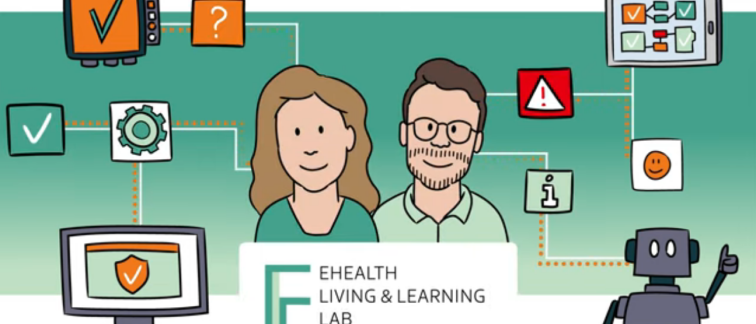It’s increasingly important for researchers to demonstrate valorization in their work. A vision for valorization via education and how to achieve that have been less well recognized. Yet Amsterdam UMC’s eHealth Living & Learning Lab Amsterdam (ELLLA) have made this a core part of their strategy. Today, ELLLA’s Linda Peute and David Neal presented their vision for valorization via education, at the first ‘Stamtafel’ event organized by the UvA Medical Faculty. Peute and Neal provided concrete examples of how they have put ELLLA’s strategy into action, and tips for those who may want to incorporate valorization in their own education activities.
Valorization is the process of transforming knowledge and expertise into impact for the benefit of society and the improvement of public health. It is one of Amsterdam UMC’s core activities, alongside care provision, research and education. In Amsterdam, the Innovation Exchange Amsterdam (IXA) guides and supports researchers and professionals in valorization.
The eHealth Living & Learning Lab Amsterdam is an ‘academic workplace’, embedded in the Amsterdam UMC Department of Medical Informatics and the UvA Faculty of Medicine. ELLLA’s interdisciplinary team consists of educators, health professionals and researchers, with expertise in human factors engineering, digital health literacy, health technology assessment and implementation science.
Rapid technological innovation in healthcare brings challenges like data fragmentation, and inequality in access to healthcare technologies. ELLLA’s overarching vision is of connected, human-centered digital health ecosystems. ELLLA therefore aims to accelerate responsible digital innovation in healthcare, aiming to align innovation with real-world needs and ensuring that technology is accessible, usable, effective and well-implemented, to benefit both patients and professionals. This vision and mission are closely tied to valorization.
Peute is an experienced educator and the ELLLA team provides over 5,500 hours of education annually, to students on the bachelor and master courses in medical informatics, master in health informatics, to medical students, and in the form of courses and training for PhD students, researchers and health and technology professionals. Neal’s research found that making a positive impact on health care was one of the most important motivations that students named for studying on their courses. Students want to work on valorization projects.
Armed with this knowledge, Peute recognized that integrating students into the processes of valorization, would help to bridge the gaps between education, research, technology, and practical implementation of technologies, while fostering a future-ready healthcare workforce that is well-prepared for the digital transformation in healthcare. In close collaboration with IXA, and in discussion with Vice-Deans for valorization and Education (Arjen Brussaard and Suzanne Geerlings), ELLLA has therefore been actively bringing together students, educators, researchers, healthcare providers, and entrepreneurs to develop and refine digital health solutions.
Examples of ELLLA’s ongoing valorization activities via education, and how they include students are:
- Allowing external public and private institutions to work with Medical Informatics Master Students to make use of ELLLA’s state-of-the-art research facilities, including mobile UX labs, eye-tracking technology, and facial recognition software, to evaluate the usability and effectiveness of digital tools.
- Working with medical students and medical informatics students to translate research findings into for health care and technology professionals, for example, Evidence-Based UX Design for Health Care and An Introduction to AI for Clinical Decision Support (in development).
- Fostering with clinical teams, from the earliest phases in the development of novel AI applications, which generate educational case studies and projects for students centered on ensuring that usability, implementation and aspects of valorization are considered throughout research cycles.
By connecting students with real-world challenges and enabling them to contribute to impactful research and implementation projects, ELLLA is strengthening their position in the job market while advancing healthcare innovation. ELLLA’s valorization activities are also revenue-generating, allowing for additional investments in educational facilities.
Peute and Neal have a number of tips for others who want to follow in their footsteps:
- Be ambitious, come up with a vision and a strategy for valorization. Impact in practice that also benefits students doesn’t just happen by itself.
- You must enjoy collaborating with a more diverse stakeholder field than usual than might be the norm for educational activities. Aside from students, ELLLA works closely with IXA, Amsterdam Medical Research, Legal Research Support, the METC, clinical departments within and beyond Amsterdam UMC, the Hogeschool van Amsterdam and ROC Amsterdam, and of course with entrepreneurs and the business community.
- Given the large and diverse stakeholder field, clear communication that conveys your vision, what you want to achieve, and what you want to do to achieve it is essential. It must always be clear what the impact of activities are – for students, for society, and for all of the relevant stakeholders.
Peute and Neal concluded their presentation with a short film on ELLLA, an example of the kind of materials that help them communicate with diverse stakeholders, and an open invitation to anyone interested in valorization via education, or specifically in collaborating with ELLLA, to arrange a coffee with David Neal or Linda Peute.

